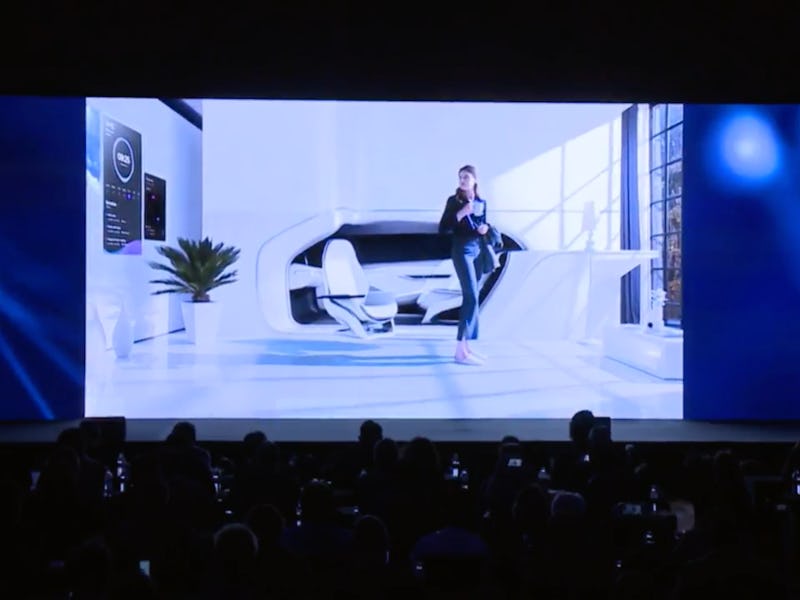Hyundai just one-upped Tesla’s Summon feature in the only way possible at this point: by making the car literally part of your house.
At the automaker’s presentation at the 2016 Consumer Electronics Show in Las Vegas, Nevada, Hyundai vice president of corporate and product planning Mike O’Brien introduced a Hyundai concept car slash house slash entertainment center that looks like it could take laziness to the most futuristic extreme yet.
“What if we could combine elements of your car and your house so it became one space?” O’Brien asked before introducing the “Hyundai Mobility Vision Concept.”
The concept is essentially a wall-dock for an autonomous vehicle, with one side of the vehicle open to a living space inside a home. A seat for the vehicle can separate from the car, and the vehicle’s electronics would be seamlessly integrated with a smart-home system. Chrysler is also working on a vehicle that plays into the idea of the car as a “third space” in between home and work, but Hyundai’s plan appears to be to completely integrate the vehicle and home. Sure, it might just turn out to be vaporware, but the design isn’t inconceivable.
Pod people, man, we're all gonna be pod people.
“In this concept you can step into a designated area of your house, and when you’re ready to go somewhere, your mobile chair would transport inside an autonomous vehicle that’s literally attached to your home,” O’Brien explained.
Blink twice if the car has taken you hostage.
The video showed how an integrated car could be part of every aspect of life, serving essentially as a workspace, home theater, and sound system for parties (but remaining unobtrusive in a kinda weird “don’t worry it won’t watch you have sex” scene).
Party car, excellent.
The idea, O’Brien said, was to create a seamless transportation experience where travelers could remain productive the entire way and get from point A to point B “Without even experiencing the sensation of movement.” The whole concept is the sort-of final extrapolation of Hyundai’s actual corporeal (non-vaporware) plans for the next 5 years. During the presentation, executives from Hyundai and the software giant Cisco elaborated on the two companies’ plans to create the next generation of Internet of Things-connected vehicles that could interface with the home, the workplace, and other cars on the road. That plan includes 14 new models of cars, including five hybrids, four plug-in hybrids, four fully-electric cars, and one fuel cell electric vehicle on the road by 2020.
The flagship of Hyundai’s future mobility plans is it’s Ioniq vehicle, which will explore the subscription model of payments, and should have fully-autonomous capabilities down the line. It looks like the next step, or perhaps a step in tandem with autonomy, is full connectivity to the other online aspects of modern life. If the Mobility Vision Concept ever comes to be, the smart home and smart car may no longer have to be connected — they might just be the same thing.
